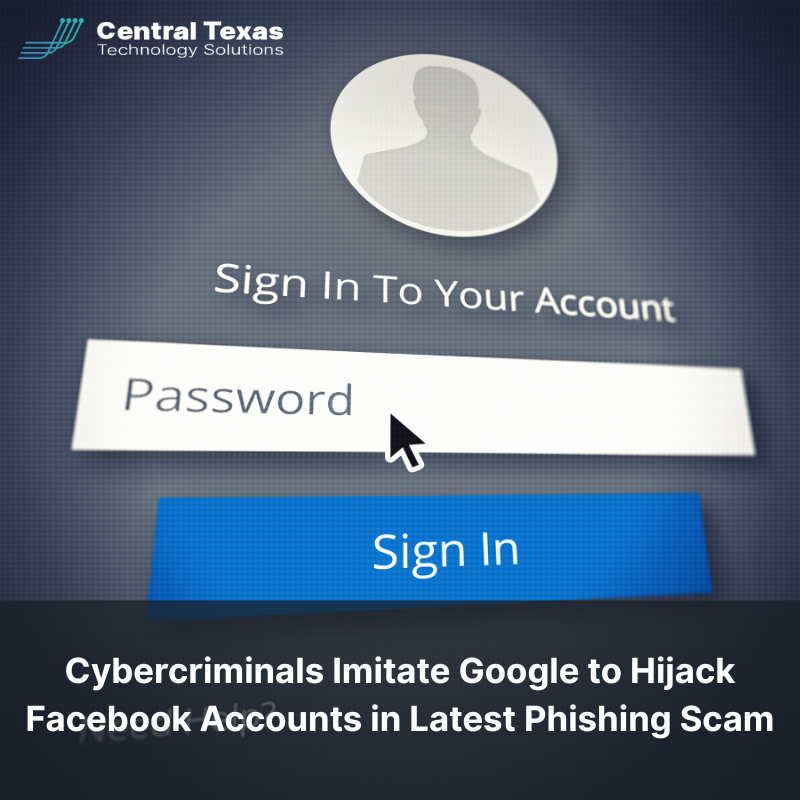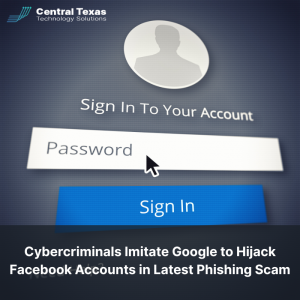
 Have you ever clicked on a link that looked like it came from Google or Facebook, only to question it moments later? That split second can be the difference between staying secure and giving hackers the keys to your digital kingdom. A recent phishing scam is making the rounds, and it’s more sophisticated than most. Cybercriminals are now impersonating Google to gain access to Facebook accounts—and businesses are at risk.
Have you ever clicked on a link that looked like it came from Google or Facebook, only to question it moments later? That split second can be the difference between staying secure and giving hackers the keys to your digital kingdom. A recent phishing scam is making the rounds, and it’s more sophisticated than most. Cybercriminals are now impersonating Google to gain access to Facebook accounts—and businesses are at risk.
How This Phishing Scam Slips Past Security
This isn’t your average spam email. Cybercriminals are now using Google AppSheet, a legitimate tool for creating business apps, to deliver malicious messages that appear trustworthy. The phishing emails come from noreply at appsheet.com, a real Google-related domain, which helps them bypass standard security filters and land directly in your inbox.
The link in the email takes the recipient to a fake Facebook login page, built to look just like the real thing. It’s designed to collect login credentials and two-factor authentication codes, giving attackers full access to your Facebook account, which often means control over your business’s ad account, page management, and more.
This isn’t just about losing access to a social media account. For healthcare providers, legal firms, construction companies, manufacturers, and nonprofits across Central Texas, a compromised Facebook account can damage reputation, disrupt communication with customers, and open the door to further attacks.
How to Protect Your Business from a Phishing Scam
You don’t have to fall victim to scams like this. A proactive, educated team is your first line of defense. Here are four actions every business should take now:
1. Educate Your Employees About Common Scams
Cybercriminals rely on human error more than technical flaws. Make sure your team is familiar with phishing tactics such as:
- Spear phishing: Highly targeted messages sent to specific individuals or departments.
- Clone phishing: Copies of legitimate emails with malicious tweaks.
- Smishing: Text-based phishing via SMS messages.
- Whaling: Executive-targeted attacks that appear urgent or financial in nature.
2. Promote a Culture of Caution
Train your staff to slow down and evaluate messages critically. Red flags include:
- Suspicious or unfamiliar sender addresses
- Generic greetings like “Dear User”
- Spelling or grammar errors
- Unusual urgency (“Act now or lose access”)
- Hyperlinks that don’t match the intended website
3. Strengthen Login Security Across All Platforms
Implement strong password policies and enforce multi-factor authentication. Every account tied to your operations—especially admin or financial roles—should have the highest level of protection.
4. Use the Right Cybersecurity Tools
Even well-trained staff can make mistakes. Back them up with:
- Advanced spam filters
- Email threat detection and secure gateways
- Up-to-date firewalls
- Business-grade antivirus and endpoint protection
Why Central Texas Businesses Are a Prime Target
Small and midsize businesses in Austin, Round Rock, and Georgetown are increasingly in the crosshairs of cybercriminals. Many assume they’re too small to be targeted, but that’s exactly what makes them vulnerable. CTTS helps protect local businesses by designing layered cybersecurity strategies built to stop threats like phishing scams before damage is done.
When you partner with CTTS, you're not just checking a box. You're aligning with a local IT team that proactively monitors, protects, and guides your business in today’s high-risk digital environment.
The Stakes Are Too High to Ignore
Hackers aren’t just going after big names. They’re targeting everyday businesses that rely on trust, uptime, and digital platforms to thrive. This latest phishing scam should be a wake-up call. You don’t need to face these risks alone—CTTS is here to help you build a safer, stronger IT foundation.
Frequently Asked Questions
Q1: How do I know if a phishing email made it through our filters?
A: Look for small inconsistencies in sender addresses, unusual requests for sensitive information, or links that redirect to unfamiliar websites. If you’re unsure, forward the message to your IT team or CTTS for review.
Q2: What should I do if an employee clicks on a phishing link?
A: Immediately change any compromised passwords, enable 2FA if it wasn’t already active, and contact your IT provider to assess potential damage or unauthorized access.
Q3: Is Facebook account protection really that important for a business?
A: Absolutely. Many businesses rely on Facebook for ads, customer communication, and branding. Losing control can mean financial loss, reputational damage, and exposure to further cyberattacks.
Contact CTTS today for IT support and managed services in Austin, TX. Let us handle your IT so you can focus on growing your business. Visit CTTSonline.com or call us at (512) 388-5559 to get started!
